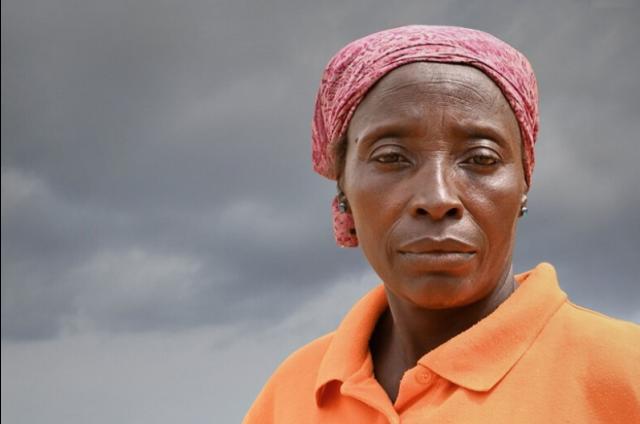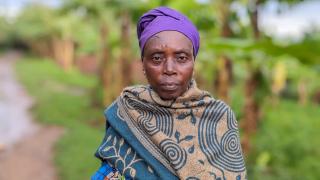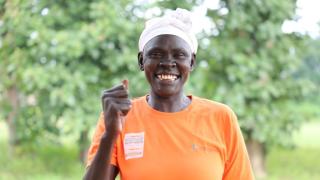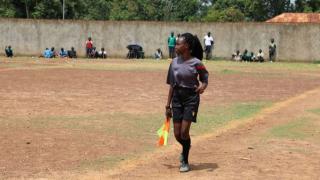How two Sudanese women are making a difference despite all odds
How two Sudanese women are making a difference despite all odds
April 2025 marks two years since the beginning of the devastating conflict in Sudan, which continues to destroy the lives of thousands, particularly women and girls. The ongoing conflict has resulted in the death of thousands of people, and many more have been injured and displaced from their homes.
According to the UN, 30.4 million people need humanitarian assistance, and over 12.6 million have been displaced from their homes; 8.6 million have been internally displaced and 3.8 million people have been forced to cross borders into neighboring countries, including Egypt and Chad.
The healthcare system has been severely impacted due to the destruction of healthcare infrastructure. Many health facilities are lacking essential medical supplies, staff and funding.
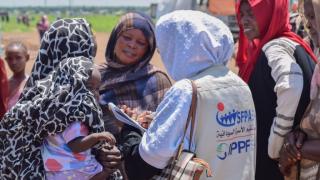
Women and girls are particularly affected, struggling to access crucial maternal and reproductive services. Alarmingly, the UN reports a rise in incidents of sexual and Gender-Based Violence (GBV), including intimate partner violence, rape, abductions and sexual exploitation.
Through our partnership with the Sudan Family Planning Association (SFPA), we provide sexual and reproductive health services to Internally Displaced Persons (IDPs) in North Kordofan. SFPA also runs mobile team clinics and trains community health workers on GBV response and holds awareness-raising sessions for women and girls.
Despite the ongoing conflict affecting healthcare workers, these dedicated professionals are on the front lines, working tirelessly to save lives amid a dangerous environment.
Dr. Asma Elnaeem, 40, an obstetrician and gynecologist, has been working with SFPA in Geneina, Western Darfur, Sudan, since 2019. She has been serving vulnerable populations and providing life-saving treatment, and she shares her testimony:
"When war broke out in 2023, my life changed. The health facility in Geneina was completely looted and destroyed, and all the staff members evacuated themselves to neighbouring Chad. The escalating violence made my job increasingly dangerous, so I moved with my family to Nyala town, where we stayed for 15 days before relocating again to Gezira state.
During the journey, I was seven months pregnant. We couldn't find a car; we were forced to use a donkey cart and spent over 25 days on the road. Unfortunately, I developed complications and couldn't find any healthcare facility or professional to assist me. After a few days, I miscarried.
I was devastated but being the sole breadwinner in my family as the others had lost their sources of income when the war started, when the SFPA offered me the opportunity to establish a health branch in Blue Nile State, I accepted and moved my family to the Blue Nile. But soon I feared the war might escalate there, so I moved them out of the country to Egypt.
I have witnessed numerous cases of sexual violence being reported and treated at our facility in Blue Nile. Women and girls are severely affected and caught in the crossfire, becoming victims of rape, trafficking, intimate partner violence and forced marriages.
Additionally, many of them are also displaced, fleeing their homes in search of safety, which places them at greater risk of exploitation. The chaos, cultural barriers, psychosocial barriers, social stigma, accessibility issues and limited access to justice complicate matters, with survivors sometimes fearing backlash from their own communities and families.
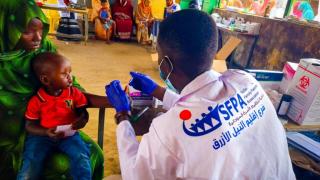
At the Blue Nile facility, including all our 15 branches in the 14 states, we provide primary health care (PHC) services concentrating on sexual and reproductive health (SRH) and HIV services, laboratory services, family planning counselling, consultation including emergency contraception, clinical treatment services for rape survivors, psychological support, post-abortion care, dignity kits, clean delivery kits, setting up mobile clinics in IDP camps and SGBV awareness sessions.
One of the most heartbreaking cases I've encountered was during the onset of the conflict: a pregnant woman in Geneina tragically lost her pregnancy and was suffering from severe bleeding. Filled with fear due to the ongoing conflict and gunfire outside, she resorted to digging a hole in her yard and sitting on it to drain the blood, believing it was her only option to cope with the situation. She told us how desperate she was to find a healthcare provider but couldn't. It was too late when I got back to check on her. Despite my efforts to provide care, she passed away two days later."
Dr. Hiba Ahmed, 53, Director of the Emergency and Humanitarian Interventions Directorate at SFPA, shares her testimony:
"When the war began, I found myself fleeing with my family from Khartoum to Port Sudan in a desperate search for safety. It was heartbreaking to take my children to Egypt, especially as the violence escalated. This move has affected their education, forcing them to repeat two years of schooling, which adds to my worries as a widowed parent. While I may not be in direct contact with the participants visiting our facilities, I am the coordinator for projects supporting our clinics across various states in Sudan.
Since the conflict began, an increasing number of women and girls have been in urgent need of services addressing SGBV.
This situation has led to decreased available supplies, a lack of funding, insufficient healthcare personnel, inadequate resources, heightened security risks, a shortage of water and sanitation facilities and a scarcity of sanitary products for women and girls.
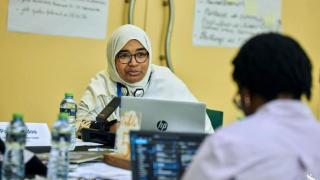
Additionally, the recent USAID budget cuts have worsened the situation and impacted our provision of sexual and reproductive health (SRH), HIV, emergency contraceptives and post-abortion services at our clinics. We are the only clinic supporting HIV clients in the Umrakuba and Tunaydbah camps in Gedarif, where we serve over 750 clients. However, these funding cuts have necessitated the temporary suspension of our programmes.
The need for support in our facilities is critical. Our medical teams require psychosocial support because they work directly with survivors and other affected community members. In places where our clinics were looted and destroyed - like in Nyala town, South Darfur, our clinic was burned down. We rely on community-based staff, such as midwives, to provide services to the community."
Even though Dr. Asma is away from her family and dealing with physical and emotional challenges, she is sacrificing her own well-being for the sake of others. These courageous women and our partners in Sudan are committed to addressing the needs of their community's most vulnerable members.
read more stories
Ida
subtitle:
"I am witnessing a significant change in my community. More women are bravely stepping forward to report injustices and fight for their rights."
Mary
subtitle:
"When the locals learnt about my efforts to stop the conflict and protect them, they appointed me as the first female Sultan—community chief—in Ronyi ... I envision a future where more women take on leadership roles in my community, believing that women are best equipped to represent women's issues."
Jozela
subtitle:
"With the support and encouragement from the incredible women in my class and our trainers, I’ve discovered how to start my own business, save money with a savings group, and, most importantly, build my confidence."

